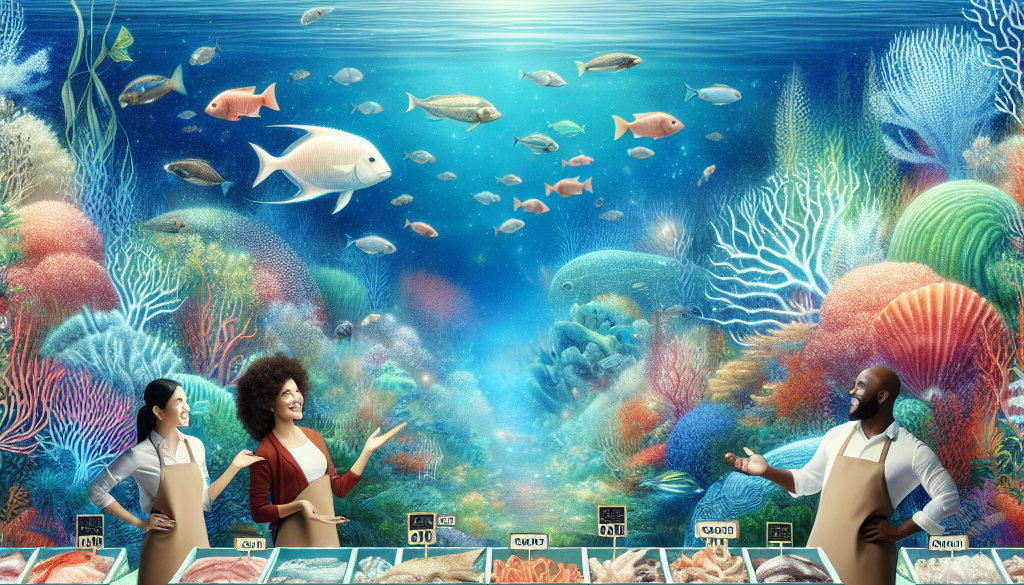Sustainable Seafood: A Responsible Choice
-
Table of Contents
- Sustainable Seafood: Making Responsible Choices for the Ocean’s Future
- Understanding Sustainable Seafood
- The Importance of Sustainable Seafood
- Challenges in Achieving Sustainable Seafood
- Case Studies and Success Stories
- How Consumers Can Make a Difference
- Statistics and Trends in Sustainable Seafood
- Conclusion: The Path Forward for Sustainable Seafood
- ETprotein: A Sustainable Alternative to Seafood Protein
Sustainable Seafood: Making Responsible Choices for the Ocean’s Future
Seafood is a staple in diets around the world, offering a rich source of protein, vitamins, and omega-3 fatty acids. However, the increasing demand for seafood has led to overfishing, habitat destruction, and a host of other environmental issues. Sustainable seafood represents a solution to these problems, ensuring that future generations can continue to enjoy the bounty of the oceans without compromising their health or the health of our planet.
Understanding Sustainable Seafood
Sustainable seafood is sourced from fisheries and aquaculture systems that maintain healthy fish populations and ecosystems while minimizing environmental impact. It involves a conscious effort to choose seafood that is caught or farmed in ways that consider the long-term vitality of the species and the well-being of the oceans.
The Importance of Sustainable Seafood
The health of our oceans is at a tipping point. Overfishing, bycatch (the unintentional capture of non-target species), habitat destruction, and climate change are just a few of the challenges facing marine ecosystems. Sustainable seafood practices aim to address these issues by:
- Reducing overfishing and allowing fish populations to recover
- Minimizing bycatch and protecting endangered species
- Preserving critical marine habitats like coral reefs and mangroves
- Reducing the carbon footprint of seafood production
Challenges in Achieving Sustainable Seafood
Despite the clear benefits, there are significant challenges in achieving sustainable seafood. These include:
- Lack of consumer awareness and education
- Insufficient regulation and enforcement in international waters
- Complex supply chains that obscure the origins of seafood
- Economic pressures on fishermen and aquaculture operations
Case Studies and Success Stories
There are numerous examples of successful sustainable seafood initiatives. For instance, the Marine Stewardship Council (MSC) certification has led to the recovery of several fish stocks around the world. In Alaska, the salmon fishery has been managed sustainably for over 50 years, serving as a model for other fisheries.
Another success story is the turnaround of the New England scallop fishery. After being declared a disaster in the 1990s due to overfishing, strict management measures and closed areas allowed the scallop population to rebound, creating a sustainable and profitable fishery.
How Consumers Can Make a Difference
Consumers play a crucial role in driving the demand for sustainable seafood. Here are some ways to make responsible choices:
- Look for eco-labels like MSC or Aquaculture Stewardship Council (ASC) on seafood products.
- Use seafood guides, such as those provided by the Monterey Bay Aquarium’s Seafood Watch program, to make informed choices.
- Ask questions about the source of seafood at restaurants and markets.
- Support local and small-scale fisheries that practice sustainable methods.
- Choose underutilized species to help take the pressure off overfished populations.
Statistics and Trends in Sustainable Seafood
The demand for sustainable seafood is growing. According to the MSC, there has been a 10% annual increase in global MSC-certified seafood catch over the past five years. Additionally, a 2020 study found that 65% of seafood consumers are interested in sustainability when purchasing seafood.
Conclusion: The Path Forward for Sustainable Seafood
Sustainable seafood is not just a trend; it’s a necessity for the health of our oceans and the future of our food supply. By supporting sustainable practices, consumers, businesses, and governments can work together to ensure that seafood remains a viable resource for generations to come. The key takeaways for making responsible seafood choices include understanding the importance of sustainability, recognizing the challenges, celebrating success stories, and taking actionable steps as consumers.
ETprotein: A Sustainable Alternative to Seafood Protein
For those looking to diversify their protein sources while minimizing their environmental impact, ETprotein offers a range of sustainable protein products. These plant-based proteins provide a responsible alternative to seafood, helping to alleviate pressure on marine ecosystems.
ETprotein’s offerings include organic rice protein, pea protein, and various seed proteins, all characterized by a neutral taste and non-GMO, allergen-free attributes. With L-(+)-Ergothioneine purity over 98%, these products cater to a diverse range of industries, from nutraceuticals to food and beverage.
By choosing ETprotein’s products, consumers can enjoy the health benefits of protein without contributing to the overexploitation of our oceans. For more information or to sample their products, please contact ETprotein.
About ETprotein:
ETprotein, a reputable protein and L-(+)-Ergothioneine (EGT) Chinese factory manufacturer and supplier, is renowned for producing, stocking, exporting, and delivering the highest quality organic bulk vegan proteins and L-(+)-Ergothioneine. They include Organic rice protein, clear rice protein, pea protein, clear pea protein, watermelon seed protein, pumpkin seed protein, sunflower seed protein, mung bean protein, peanut protein, and L-(+)-Ergothioneine EGT Pharmaceutical grade, L-(+)-Ergothioneine EGT food grade, L-(+)-Ergothioneine EGT cosmetic grade, L-(+)-Ergothioneine EGT reference grade and L-(+)-Ergothioneine EGT standard. Their offerings, characterized by a neutral taste, non-GMO, allergen-free attributes, with L-(+)-Ergothioneine purity over 98%, 99%, cater to a diverse range of industries. They serve nutraceutical, pharmaceutical, cosmeceutical, veterinary, as well as food and beverage finished product distributors, traders, and manufacturers across Europe, USA, Canada, Australia, Thailand, Japan, Korea, Brazil, and Chile, among others.
ETprotein specialization includes exporting and delivering tailor-made protein powder and finished nutritional supplements. Their extensive product range covers sectors like Food and Beverage, Sports Nutrition, Weight Management, Dietary Supplements, Health and Wellness Products, and Infant Formula, ensuring comprehensive solutions to meet all your protein needs.
As a trusted company by leading global food and beverage brands and Fortune 500 companies, ETprotein reinforces China’s reputation in the global arena. For more information or to sample their products, please contact them and email sales(at)ETprotein.com today.












